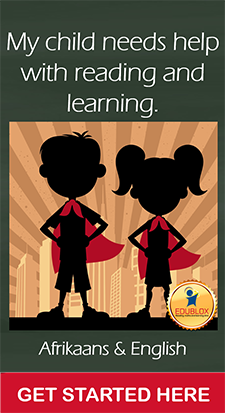
Early identification and intervention of reading and learning problems are crucial for addressing difficulties effectively and setting children on a path to reading success. Sometimes it is challenging to spot whether or not your child is struggling, and you might not be able to recognise the key indicators which could indicate your child needs some extra assistance. But don’t worry! We have compiled a list of 5 things each parent can look out for to ensure their child does not get left behind.
1. Poor phonemic awareness and recognition
The ability to match letters to their sound (e.g., identify the letter ‘b’ as the sound ‘b’ for ‘ball’) is crucial for early reading development. By Grade R/early Grade 1, learners should also be able to identify the beginning, middle, and end sounds of simple 3-letter words and change an existing word to a new word by changing one of the sounds (e.g., changing ‘cat’ to ‘sat’, ‘cot’ or ‘can’). Rhyme is a good example of sound manipulation. Difficulties in these areas could indicate a reading difficulty.
2. Poor sight word vocabulary
Another sign is if your child has difficulty recognising frequently used words that are not spelled phonetically, e.g., ‘the’, ‘so’, ‘me’. It is also indicative if your child relies on sounding out words that are read frequently and, therefore, should be part of their sight vocabulary, e.g., ‘friend’, ‘school’, ‘knee’, and ‘fast’.
3. Difficulty decoding words
Often children will guess an unfamiliar word based on its beginning sound rather than attempting to decode (sound out) the word, e.g., read ‘colour’ as ‘clear’, and ‘blow’ as ‘blue’. They may only attempt the first syllable of a longer word, e.g., read ‘language’ as ‘long’, or ‘journey’ as ‘your’.
4. Comprehension issues
Difficulty remembering and understanding what was read is a massive issue identified by schools. Older learners may struggle to discuss what was read or do poorly in comprehension tests. Check that your child understands what they are reading by asking them questions about the story. Ensure sure they don’t guess answers based on contextual clues such as pictures and prompt words.
5. Avoidance or procrastination
Expressing dislike or reluctance towards reading and learning may indicate that a child is struggling. Often, children who fear failure will attempt to mask their learning difficulties by feigning disinterest and employing work avoidance strategies. For them, it is better not to try and get poor results than to try their hardest and still fail.
If you are concerned after reading this article, don’t hesitate to reach out to your child’s teacher or services such as Edublox. The sooner intervention can be put in place, the quicker your child will be able to read effectively and achieve academic success. For more information on reading problems, read this detailed article.






Leave a Reply